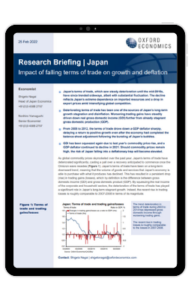Impact of falling terms of trade on Japan’s growth and deflation
 Japan’s terms of trade, which saw steady deterioration until the mid 2010s, have since trended sideways, albeit with substantial fluctuation. The decline reflects Japan’s extreme dependence on imported resources and a drop in export prices amid intensifying global competition.
Japan’s terms of trade, which saw steady deterioration until the mid 2010s, have since trended sideways, albeit with substantial fluctuation. The decline reflects Japan’s extreme dependence on imported resources and a drop in export prices amid intensifying global competition.
What you will learn:
- Deteriorating terms of trade has been one of the sources of Japan’s long-term growth stagnation and disinflation. Worsening trading gains have steadily driven down real gross domestic income (GDI) further from already stagnant gross domestic production (GDP).
- From 2005 to 2012, the terms of trade drove down a GDP deflator sharply, delaying a return to positive growth even after the economy had completed the balance-sheet adjustment following the bursting of Japan’s bubbles.
- GDI has been squeezed again due to last year’s commodity price rise, and a GDP deflator continued to decline in 2021. Should commodity prices remain high, the risk of Japan falling into a deflationary trap will become elevated.
Tags:
Related research

Post
UK: Supply constraints are probably less prominent in the south
The extent to which UK employers can respond to likely 2024 interest rate cuts with increased output, rather than rises in prices and wages, will partly reflect the extent of spare capacity. This will inevitably vary by region. Evidence on this is imperfect, but in terms of capital assets (including intangibles) and labour availability, southern regions appear to be in a stronger position than those in the UK's traditional industrial heartland.
Find Out More
Post
Global Private equity real estate fund maturities spur asset sales
We expect the significant increases in fund maturities, spurred by capital raised over the past decade, to exert upward pressure on the rate of asset disposals as the funds approach the end of their lifecycles.
Find Out More
Post
Eurozone: Little sign of harm from the Red Sea disruptions
The impact of Red Sea shipping disruption on the eurozone economy continues to be limited, in line with our baseline view. Our new Eurozone Supply Stress Indicator suggests that supply pressures have returned to normal following a period of easing in 2023.
Find Out More